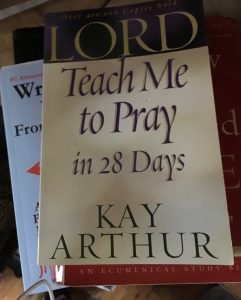 Over the years, I’ve said the Lord’s Prayer thousands of times. I’ve taken part in study groups that discussed it. The consensus being: we frequently tend to simply recite it without thinking about the meaning of the words. The second factor being: it was never meant to be an actual prayer, but an example of how to pray. I was looking for a book that would take this idea and expand upon it.
Over the years, I’ve said the Lord’s Prayer thousands of times. I’ve taken part in study groups that discussed it. The consensus being: we frequently tend to simply recite it without thinking about the meaning of the words. The second factor being: it was never meant to be an actual prayer, but an example of how to pray. I was looking for a book that would take this idea and expand upon it.
This month, I’ve been using “Lord Teach Me to Pray in 28 Days” by Kay Arthur for a kind of devotional study. I bought this book a couple of years ago and this is my third attempt to finish it. Each time before, I’d get bogged down or distracted, start letting it slide and, eventually leave it on my nightstand to be buried under other books. This time, I made a commitment, as part of my Lenten observance, to finish it. I am nearly there. The book has 28 chapters, obviously, plus four sets of group discussion questions at the back. Perhaps I would have gotten more out of it in a group setting.
This time, I scanned quickly through the earlier chapters and my notes on each. As I looked back over them, I found the Lord’s Prayer breakdown I have studied before in Days 3 through 5. It didn’t vary much from previous classes, but it didn’t really expand on them either. Days 6 through 8 seemed to be general information about the names of God and why we should worship Him. Interesting, but not what I was looking for. Day 9 is where I started to part ways with Arthur. It was here that she first said, basically, that non-Christians have no right to pray (page 53). The furthest I ever made it before was Day 9. I think this idea may have been the reason I quit reading last time. I decided that I should give her a fair hearing. Even though the book wasn’t what I hoped for, I am strong enough in my belief to listen to other points of view.
After my quick review on Tuesday, I started with Day 10 on Ash Wednesday. I am now on Day 18 and, while I still intend to finish it, I am not in agreement with much of what I’m reading. Arthur makes some interesting points and I have found some value in what she is saying, but, during this last section, I find myself frequently disagreeing with her premises. I don’t mean to say the book isn’t valuable or that what she says is, necessarily, wrong. I am simply saying that I don’t agree with some parts of it and, overall, I am not finding it helpful to my current purposes.
I was looking for something that gave me guidance on constructing prayers, on breaking down that Lord’s Prayer “outline” and using it to make my own prayers more meaningful. Arthur’s purpose seems to be more about getting measurable answers to prayer. Knowing that God answers prayers is great. Being able to point to a given situation and say, “Here’s God’s answer!” would be amazing. But, that’s not what I’m looking for and, as I said, I find myself disagreeing with her opinions at times.
I know she is a well respected religious teacher and award winning author but, I was raised with the idea that we are not to have blind faith in our leaders. Each of us is responsible for reading the Bible and drawing our own conclusions. At the end, we are the ones who must answer to God and He will not excuse us for our sins because we listened to someone else’s interpretation of His Word. So, by my understanding, I have, not only a right, but a duty to disagree.
First of all, I don’t believe that God doesn’t listen to sinners, that “prayer is a privilege reserved for those that are truly children of God.” I believe that we are all children of God. Some of us have a better relationship with Him than others, but He still listens even to those who have turned their backs on Him. Such is what Jesus meant when He told the parables of the Lost Sheep, the Lost Coin and the Prodigal Son (Luke 15: 3-32). He wanted so much for us to understand this precept that he gave us all three examples on one occasion.
Secondly, I believe that God hears all prayers. I can even say I believe that He answers all prayers. It’s just that we don’t pay enough attention and that we don’t want to accept that sometimes He says, “NO.” Arthur quotes several verses that, basically, say “Ask and ye shall receive,” but she seems to gloss over the “Thy will by done” aspect. She appears to think that, if we don’t get the answer we want, it’s because we aren’t real Christians. I can’t begin to address how wrong that seems to me.
I am not finished with the book. I still have ten more days to go. Perhaps she will address my conflicts later on but, what I’ve read so far doesn’t seem to agree with my ideas of what the scripture teaches us. Nevertheless, as I have said, I have found value in some of what I’ve read. The fact that I disagree with some of her conclusions means she has made me define more clearly my own beliefs and that also has value.